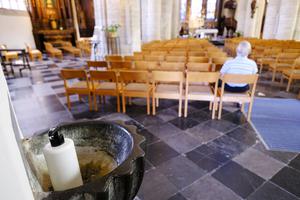9 Ways Catholics Should Respond to the Threat of COVID-19 Church Shutdowns
We must do everything possible to keep Mass and the sacraments available to God’s people.

I would like to raise, once again, some urgent concerns about COVID-19 policies — both as a citizen and especially as a priest.
Judging by the situation overseas, I think we are heading for trouble. As many places in Europe are locking down once again, pressure to do the same in the United States is bound to grow. The effect on many local communities and churches may once again become severe. In parts of New York, and in counties such as Montgomery County, Maryland, and elsewhere, officials are already executing or pondering significant lockdowns once again.
The government intrusion into our lives has been immense. Its effects have been heinous, especially on the poor and small business owners who own and run restaurants, bars, theaters, the travel and tour industry, and so on. Associated with these businesses are many workers, suppliers and supporting industries.
Families and churches have been deprived of the worship central to their mission, and of many rites of passage and celebration that help build and sustain them. Depression, suicide, alcohol and drug abuse, deferred medical and dental treatment, divorce and loneliness all rose sharply in the times of lockdown.
Yes, lengthy lockdowns mandated by governments worldwide have been odious and severe in their effects. The costs seem clearly to outweigh the possible benefits. And despite lockdowns and more severe mask mandates, COVID numbers are still rising in many places.
The heavy hand of government seems to hold all the cards. As a citizen of this land I am deeply concerned that we have ceded our rights to government officials out of a fear that far outweighs the actual threat, and that we have accepted mandates that don’t even seem to work. I do not say we should abandon all mask-wearing or other efforts to curb COVID, but the time has come to ask serious questions and demand real answers before governments demand lockdowns once again. The history of the world shows we should always be wary of intrusive and oppressive government, whether national, state or local.
Given what we know about this virus, its relatively low death rate and increasingly treatable quality, it seems far wiser to do what we have done in previous pandemics: isolate and protect the sick, the vulnerable and those known to be contagious; let others get back to work; and let life resume where human flourishing is possible.
As for the Church, permit me the solemn warning that we cannot simply do what we did before in the first shutdown. Here are nine points to consider if further restrictions are imposed:
1. If more lockdowns are threatened, we ought to proactively resist them, exhausting every chance to engage officials, and if necessary exhausting every legal appeal to the highest level possible.
2. As an essential first argument, I would ask our bishops to demand from public officials clear evidence that our church gatherings have been a source of COVID spread. They should seek to establish a coalition with Protestant and Jewish communities wherever possible in this regard. Recall that we currently follow protocols that the government said would “permit” us to reopen and curb the spread. We have complied. Hence, proof should be demanded that we have been a cause of COVID spread.
3. If evidence is not forthcoming from government officials, we should demand legal hearings to insist that our gatherings (with proper safety protocols presumed) are essential to our religious liberty and to the care of souls who need sacraments, instruction and spiritual healing. While some courts have reacted negatively to religious liberty arguments, others have ruled in favor of this basic right from God recognized by our First Amendment.
4. The bishops should further insist that we not be equated with bars and restaurants where people sit closer to each other and engage in face-to-face conversation. Rather, people sit in pews, socially distanced, while wearing masks and interacting far less.
5. The bishops should similarly assert that the care of souls is just as (if not more) essential to human flourishing than food, wine and spirits they can get at grocery and liquor stores, which these government officials call “essential.”
6. If perchance these approaches fail and we are legally forced again to cease public liturgies, the bishops should allow their clergy greater leeway in dispensing the sacraments in smaller settings, beyond the Mass. Confessions too should be widely offered. The practice of some (though not most) bishops to order churches locked and to forbid the giving of sacraments under any circumstances was to many Catholics heinous and draconian. People need the Lord. Sacraments are essential, and bishops should encourage priests to creatively use every opportunity to extend them within legal restrictions.
7. For all of the clergy, we should limit the “make a spiritual Communion” advice. It’s good advice only for those who cannot receive Communion in some other way. There is no reason we cannot give Communion outside of Mass. While some cite liturgical norms linking Holy Communion with Mass, this is only a norm and it can be bent for a serious reason, such as we already do when someone is sick.
8. Even if a new shutdown demands we cannot attract a large crowd over a certain number, we must allow priests to celebrate Mass for that small number and to offer Communion to others who come through the Church in small numbers in a given stretch of time on Sunday or other designated days. But please, bishops, do not suspend all public Masses, even if numbers are egregiously limited to 10 people. The Mass should still be offered publicly while the Church continues to fight for larger numbers in our larger parishes.
9. Please, good bishops, fight for us! The sacraments are too important to simply cancel their availability.
Sadly, with the way we handled the first shutdown, many people got the message, “Your physical health is more important than your spiritual health.” Meanwhile they were permitted to go to more “essential” places like supermarkets, liquor stores, bike repair shops and the like. Many also took part in large protests and other sorts of gatherings.
Yes, people got the message that the Church, the sacraments and the Sacred Liturgy just aren’t all that critical. We had few if any answers for them and referred them to the folks in the white lab coats while waiting for government officials to tell us when, with what numbers and even how we could say Mass and distribute Holy Communion. We largely feared to teach on the meaning of suffering and death which the Scriptures so powerfully set forth, or to summon our faithful to eschew excessive fear.
We are now seeing the bitter fruits of our failure to be with our people, out in the streets and fields if necessary. Only 30% on average have returned to Mass. Some, due to health reasons, should not return yet. But there are surely many who have simply slipped away, and will likely stay away unless we reestablish contact with them and remind them that Holy Communion and the Sacred Liturgy are essential for them.
Jesus says, “Unless you eat the flesh of the Son of Man and drink his blood, you have no life in you” (John 6:53). Jesus is our manna to get us through the desert of this world to the promised land of heaven. Without this food we perish.
Confession too should be widely available for God’s people. Churches should stay open for private prayers and smaller devotions. A locked church is a countersign and delivers the message, “We are not here for you now in this crisis.”
Please, good bishops of the United States, hear the cry of one pastor, but a pastor who has heard the cries of many of God’s people. If the government engages in further lockdowns, as is happening in Europe again, fight for us. Go to court and demand evidence that churches are deadly threats. Even if we lose, do everything possible to keep the sacraments and the liturgy available to God’s people. Give your priests room to be creative within the law.
- Keywords:
- covid-19
- coronavirus
- lockdowns
- mass
- sacraments
- subsidiarity

















